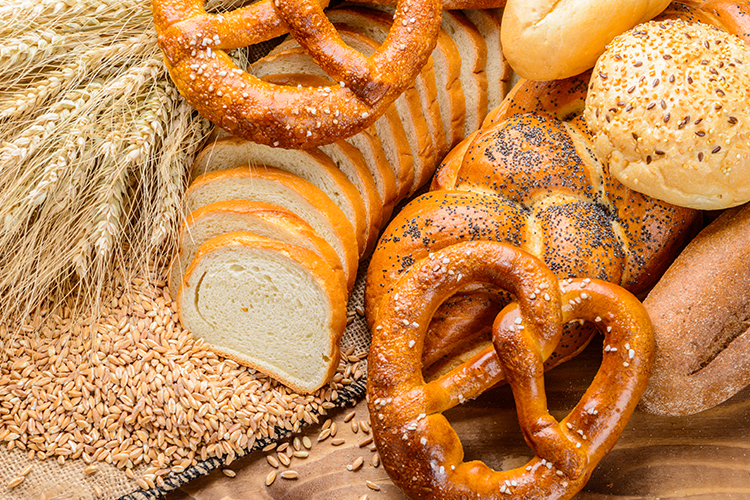Blog
Gluten – healthy or not?
 Gracing café menus and health food aisles of local supermarkets, gluten free (GF) is becoming a mainstay
Gracing café menus and health food aisles of local supermarkets, gluten free (GF) is becoming a mainstay
It is one of the fastest diet trends to hit our streets – and doesn’t appear to going away anytime soon. But why are we trending this way, and is it only a fad or is there science to indicate that reducing gluten intake may offer short and long term health benefits?
Let’s find out.
The leaders in gluten research
At the recent Bioceuticals Symposium in Sydney, some of medicine’s most brilliant and well-versed minds on the topic of gluten gathered to share research and clinical experience with gluten and impact of removing it from people’s diet.
According to research, gluten sensitivity has been linked to:
- Abdominal pain
- Eczema
- Foggy brain
- Cardiovascular disease
- Headache
- Fatigue
- Diarrhea
- Depression
- Anaemia
- Numbness
- Joint pain1;4
Why gluten?
So why is it that gluten appears to be the bad guy implicated in these diseases?
Here is a brief look at the nitty-gritty.
Dr Alessio Fasano and his team discovered a protein in our bodies called zonulin, as published in the esteemed medical journal, Lancet, in 2000.2
Basically, what we need to know is zonulin is activated by a component in gluten. Zonulin then instigates the cells in our intestinal wall to separate. This allows all kinds of substances from our intestines into our blood stream, causing inflammation and a myriad of illness (discussed more here).
For the love of bread!
Does this mean that following lasagna we are destined to a life of ill health?
Basically, no. Science is still in early stages, but what we do know, Fasano states, is “gluten triggers biological responses in everybody, but not everybody gets sick eating gluten.”
There are no studies (at least to our knowledge) as yet to indicate who are okay with gluten, and who should consider limiting their intake. It is hypothesised that up to 30% of the population are sensitive to gluten and its impact on the gut, whilst the majority recover almost immediately following ingestion without side effects.
What we do know is 1% of the population has Coeliac Disease, and gluten is a definite no-go zone for them.
We do need to ask the question, why do these issues seem to be more prevalent now, considering we have been farming gluten containing grains for over 10,000 years?
Wheat is our primary source of gluten, and wheat has changed. Over the years it has been hybridised, and the gluten content changed from 4% to 12%. This could be enough of a shift to cause reactions.
We also eat A LOT of it. And especially the heavily processed stuff. We do not farm and grind ourselves. We get pesticide laden wheat based products that could have impact on health independent of the gluten
The take home
For most, going gluten free mightn’t be necessary. Of course, there are others who disagree and this is being debated in various medical and health circles.
It is important to that if you decide to gluten-free, for whatever reason drives you, that the alternatives you have are whole foods. Many gluten free products are loaded with unhealthy, heavily processed ingredients, including sugar and hydrogenated oils.
Coeliac disease is serious – and it can present at various life stages with weight loss, anaemia, malnutrition, even schizophrenia.1;3 Avoiding gluten is a must in this case.
However, gluten sensitivity is a new world in medicine, and can manifest in a vast array of symptoms. If you are concerned, please talk with your local healthcare practitioner to undergo a controlled and safe gluten free challenge and program.
By Angela Johnson
References:
- Catassi, C, Bai, JC, Bonaz, B, Bouma, G, Calabrò, A, Carroccio, A, Castillejo, G, Ciacci, C, Cristofori, F, Dolinsek, J, Francavilla, R, Elli, L, Green, P, Holtmeier, W, Koehler, P, Koletzko, S, Meinhold, C, Sanders, D, Schumann, M, & Schuppan, D 2013, ‘Non-Celiac Gluten Sensitivity: The New Frontier of Gluten Related Disorders’, Nutrients, vol. 5, no. 10, pp. 3839-3853 15p.
- Fasano, A, Not, T, Wang, W, Uzzau, S, Berti, I, Tommasini, A, & Goldblum, SE 2000, ‘Zonulin, a newly discovered modulator of intestinal permeability, and its expression in coeliac disease’, Lancet, vol. 355, no. 9214, pp. 1518-1519.
- Jackson, JR, Eaton, WW, Cascella, NG, Fasano, A, & Kelly, DL 2012, ‘Neurologic and psychiatric manifestations of celiac disease and gluten sensitivity’, The Psychiatric Quarterly, vol. 83, no. 1, pp. 91-102.
- Sapone, A, Bai, JC, Ciacci, C, Dolinsek, J, Green, PR, Hadjivassiliou, M, Kaukinen, K, Rostami, K, Sanders, DS, Schumann, M, Ullrich, R, Villalta, D, Volta, U, Catassi, C, & Fasano, A 2012, ‘Spectrum of gluten-related disorders: consensus on new nomenclature and classification’,BMC Medicine, vol. 10, no. 1, pp. 13-13 1p.











